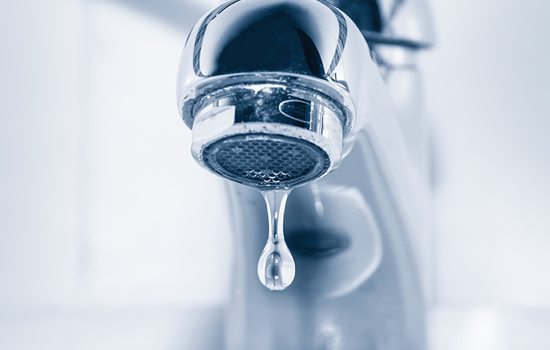How to Find Leaks
Leaks can add up quickly
A dripping faucet or other small leak in your water system may not seem like big problem. But those drops quickly start adding up and can waste up to 60,000 gallons of water a year if left unchecked. A leaky toilet can waste 200 gallons per day—the equivalent of 50 extra flushes per day.

Finding leaks
To find out if your system has any leaks follow these steps:
- Turn off all faucets and water-using appliances, such as the dish and clothes washers.
- Locate your water meter. If your water meter is inside your house, you’ll usually find it in your basement, crawl space, or utility room. If it’s outside, look for a covered “pit” in front of your house set flush to the ground.
- Lift the cover off the meter dial. On most meters, you’ll see a red “tell-tale” indicator. If it’s moving when all the water is turned off, you probably have a leak.
How to read your water meter
If your meter does not have a tell-tale indicator, simply compare two readings of your meter over a 30–60 minute period:
- Read your meter the way you would read a car odometer. Read the numbers from left to right that appear under or over the words Cubic Feet or Gallons:
- The first number on the right represents one cubic foot or gallon.
- The second number from the right represents 10 cubic feet, or 10 gallons.
- The third number from the right (usually a different color) represents 100 cubic feet (or one "CCF"), or 1,000 gallons (one “kgal”).
- One revolution of the meter sweep-hand (the arm that goes around in a circle) equals one cubic foot or 7.48 gallons.
- Read and write down the entire reading (all numbers).
- Wait 30–60 minutes, without using any water.
- Check the reading again. If the reading has changed, you probably have a leak somewhere in your plumbing system.
Other ways to check for leaks
- Check toilets for leaks by dropping a little food coloring into the tank. Wait about 10 minutes without flushing. If color appears in the bowl, you have a leak and probably need to replace internal parts.
- Check for moist spots around and under the house plumbing and around outdoor plumbing. You may need to call a plumber to repair those leaks, which besides wasting water, can also damage floors, walls, and ceilings.
Who is responsible for leaks?
If a leak occurs on the property-side of the meter, the property owner is responsible for the leak charges and repair costs. If you have checked for leaks and yet the dials are still turning, you may have a hidden leak in an underground pipe. Contact a reputable plumber for additional help and service.
If you have purchased a water line protection plan such as Homeowner Safety Valve, contact the service provider for service. Learn more about Homeowner Safety Valve.
Preparing for the worst
How to find the emergency shut-off valve
If a water pipe broke in your home, could you quickly find the emergency shut-off valve? Find out where it is before you have an emergency and show it to every family member. Here’s where to look for it:
- In the basement or crawl space, where the water line enters the home.
- In the garage where the water line enters the wall or ceiling, near the water heater or laundry hookup.
- Outside near the foundation, often protected by a concrete ring or clay pipe.
Once you locate it, turn the valve gently to make sure it hasn’t frozen from lack of use. If it won’t turn, have a plumber replace it.
Leak detection checklist
Here are some of the most likely places to look for drips or moisture that indicates a plumbing leak:
Kitchens
- Sink faucet and spray hose
- Dishwasher
- Refrigerator (including icemaker)
Bathrooms
- Toilets
- Bathtub faucets
- Showerheads
- Skin faucets
- Jacuzzis
- Bidets
Laundry rooms, utility rooms, and basements
- Washing machine
- Water softener
- Humidifier
- Hot water tank
- Boiler
- Utility sink
- Pipes and shut-offs
Outdoors
- Faucets
- Garden hose and connections
- Lawn sprinkler system
- Swimming pool
- Hot tub or spa
- Ponds and fountains
